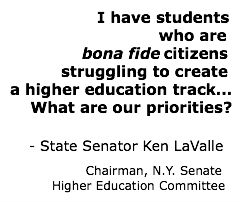Congress will again take up comprehensive immigration reform in 2014 and Sen. Chuck Schumer says he believes “it’s going to happen” this year. Schumer made that prediction yesterday on the ABC News talk show This Week.
One sticking point for previous reform efforts has been the concept of a path to citizenship for undocumented immigrants, including those brought to the U.S. as children. Legislation that would provide them with permanent residency, under certain conditions, has been debated in Congress since 2001, but the Development, Relief, and Education for Alien Minors — DREAM — Act has not garnered enough support in both houses of Congress to become law.
Fourteen states have passed their own versions of the DREAM Act, and the Obama administration in 2012 launched the Deferred Action for Childhood Arrivals, which allows “Dreamers” to register with the federal government every two years to obtain deferrals of deportation actions.
Passing a N.Y. DREAM Act “to provide educational support for immigrant youth” will be a top priority for the Assembly Democratic Conference this year, according to Assembly Speaker Sheldon Silver. The measure would provide immigrant students access to the state’s various educational assistance programs, increase access to family tuition accounts and establish a “DREAM Fund,” a privately funded scholarship program.
If the measure is adopted, New York would become just the fourth state to allow undocumented immigrant students access to state financial aid. A similar bill passed the Assembly last year, but did not pass in the Republican-controlled State Senate. The fate of the N.Y. Dream Act remains uncertain in the State Senate in 2014.
 State Sen. Kenneth LaValle (R-Port Jefferson), chairman of the Senate’s higher education committee, said the proposed state legislation “might be something we would consider” if there were steps taken to address the needs of citizens and their college-aged children first, including the tuition increases they face.
State Sen. Kenneth LaValle (R-Port Jefferson), chairman of the Senate’s higher education committee, said the proposed state legislation “might be something we would consider” if there were steps taken to address the needs of citizens and their college-aged children first, including the tuition increases they face.
“I have students here who are bona fide citizens, struggling to create a higher education track. It does go to the issue of, ‘What are our priorities?'” LaValle said.
These issues have deep meaning close to home, as many Riverhead High School students and graduates are undocumented immigrants brought into the U.S. as children.
RiverheadLOCAL spoke to “Magdalena” and “Maria” in August 2012, each consenting to be interviewed on the condition of anonymity. It was two months after each graduated near the top of their class, but neither knew where they would go from there. See prior story, “Their dreams deferred: RHS immigrant graduates in limbo.”
The federal Deferred Action for Childhood Arrivals initiative launched that same month.
Both teens applied successfully, two of the 567,563 accepted through August 31, 2013, according to the most recent data available. Of those, 23,000 were in New York.
 Life has been a lot different since, they both say.
Life has been a lot different since, they both say.
Magdalena, who came from Eastern Europe with her parents when she was 9 years old, has enrolled in college, gained work eligibility and received a Social Security number. She declined to go into specifics, but she said her world has opened up.
Without the deferred-action initiative, options for higher education and employment would have been limited to schools her family could afford out-of-state tuition for and off-the-books jobs.
“I think I feel like I can be more of a human now. Before I felt very confined, restricted,” she said.
Maria was 8 when she arrived in the U.S. from South America in 2003. Her parents obtained tax ID numbers before post-Sept. 11 rules made it impossible, so they were able to establish a business, pay taxes, buy a house and cars. With their savings they were able to send their daughter to Stony Brook University, albeit at the much higher, out-of-state tuition rate ($16,190 versus $5,570 for state residents.)
Thanks to the deferred-action initiative, Maria has been able to move into the dorms on campus, which was out of reach previously due to cost. Not commuting has changed her experience, she said, and she can have her car on campus because she has a driver’s license.
“It’s easier to get around, easier to be involved in campus activities and life. I can go out more easily with friends – I’m more available,” said Maria, who’s studying biology with a concentration in neuroscience. She’s also enrolled in an EMT course this semester with her eye on the university’s ambulance corps.
Magdalena and Maria will have to reapply every two years to maintain the deferment, at a cost of $465 each time. Maria’s two younger brothers also stand to benefit from the program — if it remains available.
In June of last year, House Republicans passed a homeland security appropriations bill with an amendment that would de-fund the president’s Deferred Action for Childhood Arrivals initiative, effectively eliminating the administration’s prosecutorial discretion with respect to undocumented immigrants like Maria and Magdalena. In a divided partisan vote, with First District Congressman Tim Bishop joining 171 other Democrats and 10 Republicans in opposition, the bill passed the House 245-182. It has not yet been acted on by the Senate.
Magdalena, 20, said the deferred action program has changed her entire perspective on life.
“As an undocumented person, especially one growing up, your aspirations are always very limited. Everything is conditional. ‘Oh maybe one day I’ll get to do this or achieve this if I get my paperwork.’ I don’t know if it’s my age, or getting some of the paperwork that I have gotten, that I feel like when I look ahead at my future my legal status is not the first thing that pops into my mind.”
Photo captions, from top: 1. In March 2010, 200,000 people marched on Washington to call for comprehensive immigration reform. Photo credit: R. Renner/Wikimedia Commons; 2. Riverhead High School commencement, 2012. RiverheadLOCAL photo by Peter Blasl
The survival of local journalism depends on your support.
We are a small family-owned operation. You rely on us to stay informed, and we depend on you to make our work possible. Just a few dollars can help us continue to bring this important service to our community.
Support RiverheadLOCAL today.





























